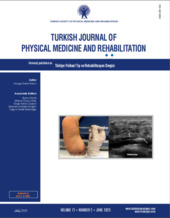Duchenne muscular dystrophy patients diagnosed at the asymptomatic stage: What are the benefits of early diagnosis?
2 Department of Physical Medicine and Rehabilitation, İzmir University of Economics Faculty of Medicine, İzmir, Türkiye
3 Department of Neuromuscular Disorder, Tepecik Training and Research Hospital, İzmir, Türkiye DOI : 10.5606/tftrd.2024.15025 Objectives: This study aimed to demonstrate whether a diagnosis given at the asymptomatic stage of patients with DMD can affect the clinical outcomes and to define the clinical characteristics of the patients.
Patients and methods: The cross-sectional study was conducted with 136 male patients (mean age: 8.8±3.7 years; range, 3 to 17 years) with DMD between March 2021 and February 2022. The patients were diagnosed through clinical presentation, pathology studies, and genetic testing. The demographic, clinical, and the laboratory data of the patients were recorded. The patients were evaluated in two groups: those diagnosed at the asymptomatic stage due to elevated creatine kinase (CK) and those diagnosed due to clinical symptoms. Patients were further stratified according to their age groups: those younger than 10 years and those aged 10 years or older. Hand grip, quadriceps muscle strength, and Vignos and Brooke motor functional assessment scales of the two groups were compared.
Results: In patients who were diagnosed with CK levels, CK elevation was significantly more common than other findings. When the age at diagnosis was evaluated, the age at diagnosis in those diagnosed with CK levels was statistically significantly lower than in those diagnosed with clinical findings. No significant difference was detected in clinical findings between the groups under the age of 10 years. Among patients aged 10 years or older, hand muscle strength, quadriceps muscle strength, and Vignos and Brooke motor function scale scores were significantly better in those diagnosed with CK levels compared to those diagnosed with clinical findings.
Conclusion: This study shows that early diagnosis in the preclinical period, which enables earlier medical treatment and rehabilitation, may have a positive effect on motor functions and the course of the disease.
Keywords : Diagnosis; Duchenne muscular dystrophy; rehabilitation

















